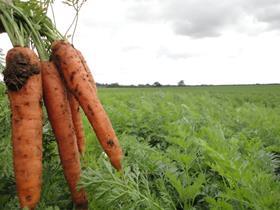
Sales of organic products increased by 4 per cent in 2014.
The new figures announced today (24 February) in the unveiling of the Organic Market Report 2015 come in a year when both food prices (down 1.9 per cent) and food spending (down 1.1 per cent) fell.
While sales of organic fresh fruit in the UK were up by 6.4 per cent, sales of organic vegetables were down by 2 per cent, albeit in a year where non-organic sales plummeted at five times this rate,and sales of organic salads were down by 1.6 per cent.
Finn Cottle, trade consultant at Soil Association, said: 'I have spoken to a few organic fruit growers and packers, and they told me it has been a strong year with good demand. But the pressure on vegetables as a whole has made it a tough year.
'There's probably more availability of organic fruit on shop shelves, and that helps make that part of the sector buoyant, apples in particular, although I wouldn't say we've promoted it any more than usual.
'With salads, it's a lack of presence. There have been a few delistings over the last few years, although organic tomatoes are doing well.'
Shoppers spent an extra £1.4 million a week on organic products and the organic market exceeded £1.86bn, bringing sales back to levels in 2009. Growth in sales across Soil Association Certification symbol holders, meanwhile, increased by 7.7 per cent.
Dairy products and fresh fruit and vegetables were the most popular organic purchases, while the strongest market growth was through online shopping and box schemes (11.7 per cent) and independent retailers (5.7 per cent), which offer the choice and convenience of extensive organic ranges in one place.
There was also significant growth in organic supply into catering (13.6 per cent), reflecting growth of the Soil Association’s Food for Life Catering Mark in schools, workplaces and hospitals. The market exceeded £1m a week for the first time, and is now worth £55.8m.
Helen Browning, Soil Association chief executive, said; “Three years ago, commentators were writing off the organic market in the UK. Now, with a third year of steady growth, and against a falling overall food market, it’s clear that reports of organic food’s demise were premature to say the least.
'This reinvigoration may be partly related to an improving economy, but it’s also testament to the fact that retailers and manufacturers who continued to invest in organic lines have continued to thrive. Now, even the discounters are beginning to stock organic ranges.”
Responding to the report, Andrew Burgess, director of agriculture at the Produce World Group, said: “The continuous growth of organic products, despite numerous challenges in the retail environment, highlights the strength of the organic sector in providing new innovative products to new customers.
'The organic sector and Produce World are embracing the current retail challenges and investing strongly in marketing and new organic product development. This has been reflected in the growth of organic products being sold through online shopping channels and box schemes, such as our Nature’s Premium brand of vegetable boxes.”
“As one of the UK’s leading organic growers, we know from our own figures that more people are buying organic, with taste and quality being big reasons behind this consumer trend. We want to continue playing a part in the growth of organic products by showing that top quality, great tasting and good looking organic vegetables are available all year round for any occasion.”
His colleague, Andrew Ovens, said that organic carrots remain an entry point to the organics market for most consumers, for a variety of reasons.
He added that Produce World is intending to grow its own organic brand and increase its distribution during 2015, focusing on the online and convenience channels, as 'consumers want a real point of difference there.'



